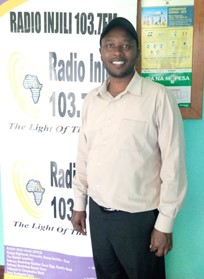Piercing through fake news to deliver life-giving jab
Psychologists have defined conspiracy theory as “a subset of false narratives in which the ultimate cause of an event is believed to be due to a malevolent plot by multiple actors working together.”
gh the phrase apparently existed since the 1800s, it only came into popular use with the assassination of America’s 35th President, JF Kennedy, on November 22, 1963. The impact was such that even the commissions set up to investigate the assassination was viewed as part of the conspiracy to hide the truth. In short, conspiracy theories create a room of ‘smoke and mirrors’ in which truth and lies become nearly impossible to distinguish. That’s why it took Kathryn Koskei, the Programs Manager at Radio Injili FM station in Kericho County, a while to decide on getting the Covid-19 vaccine. By the time she did, Kenya had run out of vaccine supplies.

It was on February 11, 2020 that the International Committee on Taxonomy of Viruses (ICTV), in consultation with WHO, named a deadly new viral disease “severe acute respiratory syndrome coronavirus 2 (SARS-CoV-2).”
As Covid-19 raced across the world, conspiracy theories also wore their running shoes to catch up with it and frustrate the search and distribution of a vaccine. The theories claimed a lot of victims along the way. After initially rejecting the vaccines, Kathryn changed her mind. “I was sceptical,” she says. Kathryn comes from a family where people not only question things but also relentlessly seek answers.

“I had an entire family of strongly sceptical people around me – my dad and my siblings,” she says with a laugh. She also decided to do her own research, talking to medical professional wherever she found them. The decision was somehow forced upon her when her station, which is part of the Digiredio platform, was to start airing “Pata Chanjo Ya Tumaini” which is a programme that aims to increase demand for the COVID-19 vaccine among eligible groups.
“We are a religious broadcaster committed to truthfulness,” she explains. “I had to confront the fact that our station would only accept to run such a programme if it was credible and came from credible sources.” Doctors and other health experts came on air during the programs and “I made a point of side-chatting them.” Information from the show convinced members of her family to change their mind. To her surprise, the first to receive the Covid-19 vaccine was the chief sceptic himself, her dad. Other family members followed in quick succession until Kathryn alone was left. “I now stand in line awaiting the vaccine,” she says in self-deprecating laughter.
Forty-year old Pastor Pheanson Kirui of the African Gospel Church did not follow such a convoluted path but he was not exactly enthusiastic at the vaccine. “My problem was lack faith in the vaccine,” he says. “However, I’m a frontline worker by virtue of being a pastor. I received the vaccine.” Pastor Kirui’s fears did not end with the first jab. “On learning that the second would delay, we wondered if we would be left marooned in a medical no-man’s land,” he says. Thankfully, the second dose, though a month late, arrived. Since then, even his wife has got it.

Radio Injili’s continuity Presenter and News Anchor Ken Cheruiyot is confident that the Pata Chanjo ya Tumaini Campaign has increased acceptance of Covid-19 vaccines in their community. We do radio spots and drama every week that present different scenario that illustrate the benefits of the COVID-19 vaccines,” he explains. “Each week has its own theme that forms the topic of discussion and interviews on air each week. Before the Pata Chanjo ya Tumaini, the feeling was that Corona was fake and a vaccine unnecessary. But how else could the spike in deaths and burials be explained?”
Slowly, the programme has brought the people around. “The initial negative feedback in on-air calls became enquiries about where to get the vaccine,” Ken says. “That sounds like success.”
This reporting is with support of UNICEF Kenya under the Pata Chanjo kaa Chonjo COVAX Campaign being run by Centre for Behaviour Change and Communication (CBCC). The campaign purpose is to alleviate fears and mistrust of vaccination and promote confidence and acceptance of vaccination leading to demand and uptake of the COVID-19 vaccine among eligible populations.
Our Services
View our Centre for Behaviour Change and Communication Services.













